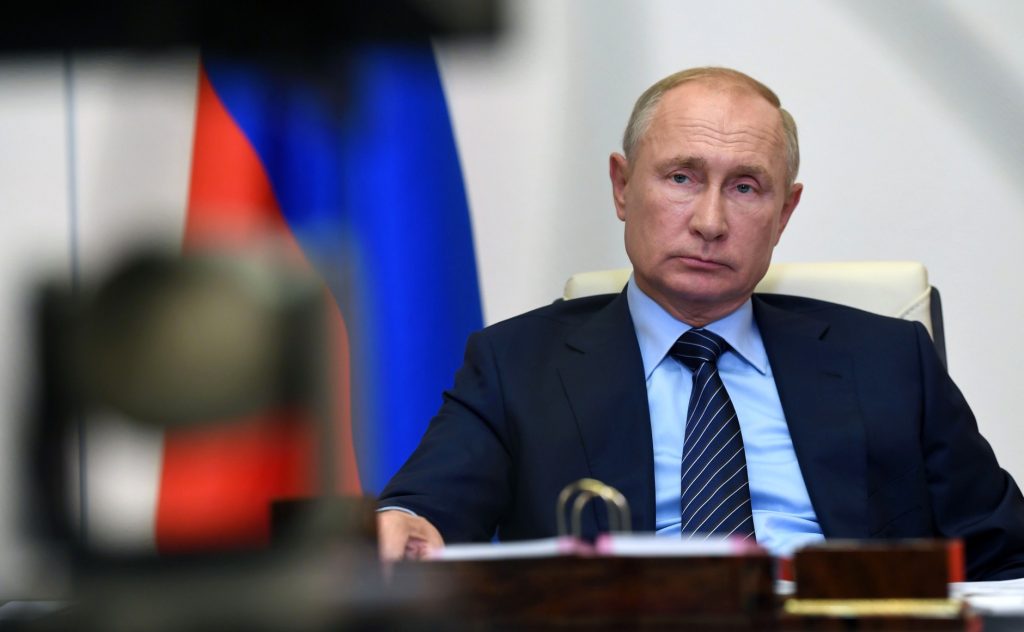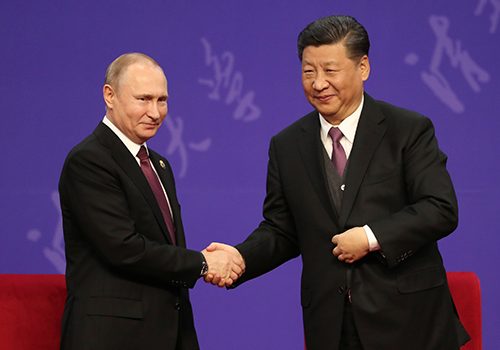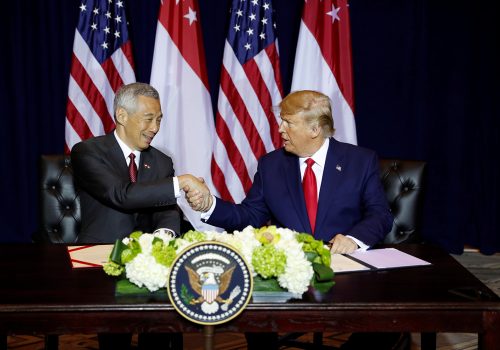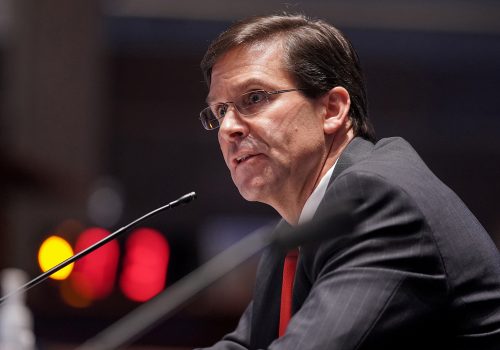For all the legitimate focus on rising U.S.-China tensions, this summer’s sleeper surprise for the West is more likely to emerge from Vladimir Putin’s Russia.
That’s because the built-in contradictions between Russia’s international ambition and domestic rot that have always characterized Putin’s rule, now into its 21st year, are coming to a head in a manner that provides him both greater opportunity and peril.
The brutal effectiveness of his thugocracy state is increasing, with a military modernization that includes a newly detected test of anti-satellite space weapons, highly publicized advances in hypersonic technologies, and worldwide intelligence operations that effectively employ advanced technology and a lower-tech army of mercenaries.
At the same time, the weakness of his demographically aging, economically ossifying, COVID-hit country continues to grow in the wake of lower oil prices. The World Bank projects a 6% decline in Russian GDP in 2020 in a country that already had 12.3% of its population, or 18 million people, below the poverty line.
Greater opportunity for Putin presents itself in a United States that’s distracted by the coronavirus spread, its own economic downturn, racial upheavals, polarizing November elections and divisions with and within Europe. With the chance that his friend President Trump might lose November elections, Putin could calculate that now could be the time to seize new opportunities.
The peril is symbolized by surprisingly large and enduring protests in the far eastern city of Khabarovsk, which continued this weekend. New Levada polling shows that 45% of Russians say they approve of the recent wave of anti-Kremlin protests, and Putin opponents look to convert this energy into something more.
What’s difficult to predict is whether an August surprise – or one at any time ahead of U.S. elections in November, would grow more from Russia’s strength, its weakness or more likely some combination of the two. It has been times like these in the past, when matters had seemed sour for Moscow, when Putin has turned to adventures abroad to solidify his domestic control.
Get the Inflection Points newsletter
Subscribe to Frederick Kempe’s weekly Inflection Points column, which focuses on the global challenges facing the United States and how to best address them.
So should one be watching for a surprise of the sort of the Russo-Georgian war of August 2008, the seizure and annexation of the Crimean Peninsula in 2014, the Russian military intervention in the Syrian civil war in 2015 until now, or more electoral and disinformation activity in Europe and particularly around U.S. elections this November.
On that front, the first indicator could be Russian response to the Belarus election a week from Sunday on August 9. Janusz Bugajksi of the Center for European Policy Analysis reckons that Putin could use “the pretext of growing unrest in Belarus and the disputed presidential elections” as a chance to act as national liberator with the “looming prospect” of the absorption of Belarus into Russia.
Following the arrest this week of 32 Russians at a sanatorium near Minsk, Belarus President Alexander Lukashenko accused the Kremlin-linked Wagner military contractor of sending 200 of its mercenaries to destabilize his country ahead of his elections, where he faces a challenge from three opposition groups.
What’s clear is that Putin’s relations have soured dangerously with Lukashenko, who has resisted Russia’s efforts to effectively merge the two states into a Moscow-dominated union. Lukashenko has been reaching out to Europe and the United States, including a February visit by Secretary of State Mike Pompeo.
Most of all, Putin will resist any further erosion of Kremlin power in its own region that would be prompted by a tilt either by Lukashenko or his opposition toward Western institutions or allegiances, akin to Georgia and Ukraine.
Some analysts say Putin’s appetite for such an adventure has run its course. That’s unlikely, however, until he experiences more painful pushback than he has thus far from the United States, Europe or others.
In an interview with Axios on HBO this week, Trump said he hasn’t confronted Putin with intelligence that Russia paid the Taliban to kill American soldiers in Afghanistan. Trump spoke to Putin this Tuesday, one of at least eight times he’s done so since the intelligence landed in the President’s Daily Brief in late February
If past performance is any indicator of future outcomes, don’t join the wishful Western thinkers who believe that Russia’s economic pain and domestic opposition has advanced so far that Putin is in greater danger than are his adversaries.
If anything, he has been encouraged by his string of international advances in the face of little pushback and, like the schoolyard bully who hasn’t yet felt a serious below, he will continue his life’s work of undoing the wrong of Soviet collapse in any way available to him.
A powerful new book by Financial Times correspondent Catherine Belton, Putin’s People, “demonstrates how the future president made full use of KGB methods, contacts, and networks at each stage of his career,” writes Anne Applebaum in a review of the book in The Atlantic.
No less a source than Russian businessman Vladimir Yakunin, who with Konstantin Malofeyev helped set up organizations across Europe that would promote alternatives to democracy and European integration, told Bolton it was all about restoring Russia’s “global position.”
Angela Stent, a consistently wise American expert on Russia writes that, despite its limited economic capabilities, Russia could become “an even more influential international player.” That’s in part because of growing doubts about U.S. reliability among allies.
Despite the prevalent view in Washington of Putin as a thuggish dictator, his global partners – including a number of senior Middle Eastern officials with whom I’ve spoken – see him as a reliable, pragmatic leader with whom they can do business. They’d rather deal with Russia in Syria than Iran, and they’d rather have Russia in Libya than Turkey.
As to the prospect of a summer bombshell, Stent writes: “As has been the case throughout Russian history, things appear to be stable until suddenly they are not. Putin likes to surprise, as was clear from his hastily arranged referendum. But he himself could face unanticipated challenges to his plan to stay in power indefinitely.”
As for this August, however, my bet would be that if there is a surprise, it will be one of Putin’s choosing.
This article originally appeared on CNBC.com
Frederick Kempe is president and chief executive officer of the Atlantic Council. You can follow him on Twitter @FredKempe.
THIS WEEK’S TOP READS
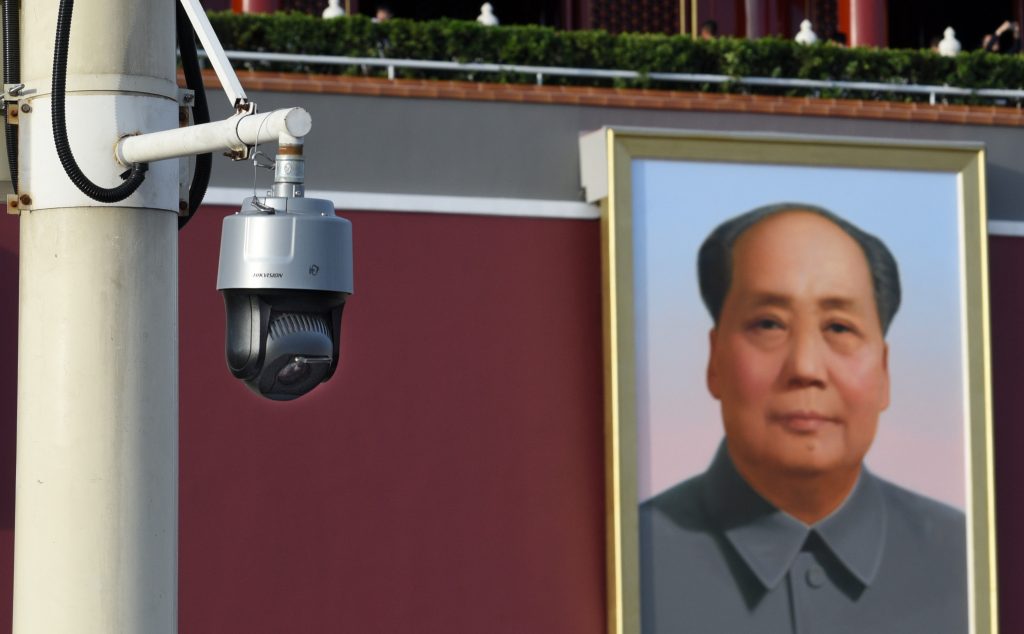

This week’s top reads include Anne Applebaum’s reflections on Catherine Belton’s new book on Putin in The Atlantic and Kirk Bennett’s look at the risks in the Belarus elections in The American Interest.
The week’s must-read is Ross Andersen’s chilling, long-form look at China’s rapidly developing surveillance state, also in The Atlantic. Don’t miss two other strong pieces on China: One comes from Anja Manuel and Kathleen Hicks in Foreign Affairs on how best to address China’s civil-military fusion, and the Atlantic Council’s Barry Pavel sizes up the new Chinese-Iranian alliance in The National Interest.
It’s fitting that this week’s Inflection Points end with the inspiring words of Rep. John Lewis in a New York Times essay published on the day of his funeral. “Ordinary people with extraordinary vision can redeem the soul of America,” he writes.
With that, Inflection Points will take August off and return after Labor Day (barring special editions in response to events). Thanks for your readership and enjoy the rest of this unusual summer.
#1. “PUTIN’S PEOPLE”
A KGB Man to the End
Anne Applebaum / THE ATLANTIC
Anne Applebaum delivers a masterful reflection on a new book by FT correspondent Catherine Belton, Putin’s People that, Applebaum writes, “will surely now become the definitive account of the rise of Putin and Putinism.”
Read this article – and buy and read the book – to understand what motivates Putin (Russian glory and vengeance against the U.S.), how he has risen (KGB methods, contacts and networks), and why the empire of finances, intelligence and military he has constructed will defy any easy disruption.
It is all, in the telling of Applebaum, “Putin’s ideological answer to the trauma he experienced in 1989” as a KGB officer in Dresden who witnessed the collapse of East Germany and then of the Soviet Union itself.
With all eyes on China, too many are missing the lasting nature of Putin’s revanchism and the fact that a few more chapters of this story are likely to unfold before it’s over, following this year’s referendum that would allow Putin to hold power until 2036 and age 83. Read More →
#2. WATCHING BELARUS
Should the West Be Worried About Belarus?
Kirk Bennett / THE AMERICAN INTEREST
Even if you haven’t paid any attention to Belarus in the past couple of decades, the next month would be a good time to do so due to an election that analyst Kirk Bennett argues could trigger a Russian move to absorb the country that was once part of the Soviet Union.
“Let me emphasize that the Russian-intervention scenario is merely a caution, not a prediction,” writes the former State Department official in the best handicapping I’ve read of the situation. “Still, in light of Russia’s surprise seizure of the Crimea in 2014, no one should rule out an opportunistic move against Belarus should the circumstances offer the chance.”
Bennett muses about whether the characteristically submissive Belarussian people will accept Lukashenko stealing another election “more blatantly and shamelessly than ever before.” Or might they instead stand by while Russia’s “little green men seize control of his country and the Kremlin expeditiously orchestrates the demise of Belarussian statehood.” Read More →
#3. CHINA’S SURVEILLANCE MACHINE
China Is What Orwell Feared
Ross Andersen / THE ATLANTIC
The Atlantic’s Ross Andersen delivers this week’s must-read: the most frightening, disturbing, deeply reported and well-written story on China’s unfolding surveillance state that I’ve read to date.
“The emergence of an AI-powered authoritarian bloc led by China could warp the geopolitics of this century,” he writes, after having visited the Institute of Automation just northwest of Beijing’s Forbidden City. “It could prevent billions of people, across large swaths of the globe, from ever securing any measure of political freedom. And whatever the pretensions of American policy makers, only China’s citizens can stop it.”
He focuses on how Xi has used the Uighur people and Xinjiang autonomous region “as a laboratory to fine-tune the sensory and analytical powers of this new digital panopticon before expanding its reach across the mainland.”
As the headline says, Andersen argues this is the world that Orwell feared. Read More →
#4. HOW TO ANSWER CHINA
Can China’s Military Win the Tech War?
Anja Manuel and Kathleen Hicks / FOREIGN AFFAIRS
China and Iran are about to Become Allies—Here’s What We Should Do about It
Barry Pavel / THE NATIONAL INTEREST
With China pursuing strategies across so many spectrums, it’s worth reading Anja Manuel and Kathleen Hicks in Foreign Affairs on how best to counter Beijing’s civil-military fusion – an approach easier to achieve in an authoritarian system.
“The United States and its allies should take seriously Beijing’s efforts to militarize China’s technological base,” they write. “Yet they should also recognize the strategy’s limitations, to avoid overreacting in ways that would prove counterproductive. China’s bureaucratic and authoritarian approach to civil-military fusion is likely to waste considerable time and money. By trying to control innovation, Beijing is more likely to delay and even stifle it.”
Their solution is that the U.S. should “build on existing U.S. advantages in research and technology—advantages that are increasingly at risk not because of China but because of a lack of agility and creativity among U.S. planners and policymakers.” Read More →
Writing in The National Interest, the Atlantic Council’s Barry Pavel lays out a strategy to respond to the emerging Chinese-Iran alliance. “It is a milestone in history,” he says, arguing that reports thus far have underestimated this new alliance’s significance. “It constitutes a major new element in our new era’s shifting geopolitical dynamics, setting the stage for a long-term confrontation between the democratic world and the authoritarians.” Read More →
#5. R.I.P. JOHN LEWIS – AND THANK YOU
Together, You Can Redeem the Soul of Our Nation
John Lewis / THE NEW YORK TIMES
Rep. John Lewis sent this essay to The New York Times two days before his death. It’s worth reading every word to draw inspiration for the future from a man of extraordinary principle and courage. Or listen to the actor Morgan Freeman read it on MSNBC.
“When you see something that is not right, you must say something,” Lewis wrote. “You must do something. Democracy is not a state. It is an act, and each generation must do its part to help build what we called the Beloved Community, a nation and world society at peace with itself.”
He continues, “Ordinary people with extraordinary vision can redeem the soul of America by getting in what I call good trouble, necessary trouble … The vote is the most powerful nonviolent change agent you have in a democratic society. You must use it because it is not guaranteed. You can lose it.” Read More →
Rest in peace, John Lewis. And thank you.
QUOTE OF THE WEEK
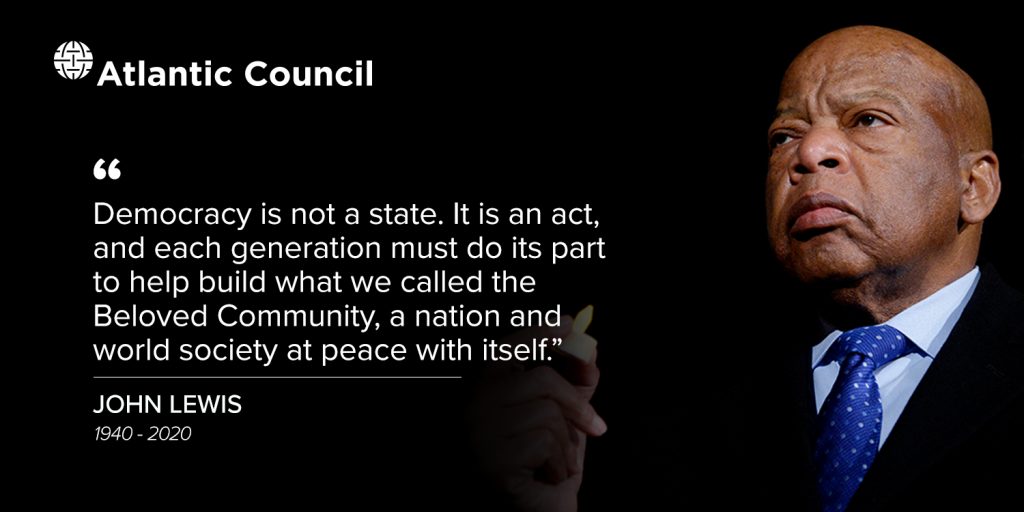

ATLANTIC COUNCIL TOP READS
Image: MOSCOW, RUSSIA- Russian President Vladimir Putin held a video conference on the ecological situation in the city of Usolye-Sibirskoye, Irkutsk region in Moscow, Russia on July 30, 2020.
